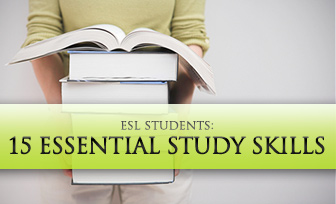Language instruction may not look or sound like the teaching happening in other classrooms, but often that’s exactly where your ESL students are planning to go.
A large percentage of ESL students, especially those who travel to the U.S. to study the language, do so in preparation for higher education in the U.S. They plan to pursue undergraduate or graduate studies at a college or university. Students focus on English until their language skills are at a high enough level that they can flourish in English only classes. These students, however, will need more than just language skills if they are going to succeed in an American college or university. Here are some essential study skills that ESL students will need for success in higher education.

Essential Study Skills for ESL Students to Succeed in Higher Education
-
1
Reading Skills: SQ4R
One of the most popular reading strategies for textbooks is the SQ4R method. When students follow these steps, they will process and remember information better, and their textbooks are sure to be full of important information. These are the six steps to this reading strategy. Teaching your students this process can make a significant difference in how productive their study time is.
- Survey the chapter to get a general idea of what material it covers.
- Write questions for each heading and subheading, predicting what the chapter will cover.
- Read the information, one section and one paragraph at a time.
- Record the information for that paragraph using a variety of note taking strategies. This may include writing a summary of what the paragraph said or drawing a picture or chart that summarizes the information.
- Recite the important information from each paragraph aloud.
- Once the chapter is complete, review the information in the entire chapter.
-
2
Listening Skills
Understanding lectures will likely be one of the biggest challenges ESL students face when they enroll in fulltime English classes. Active listeners listen with the intent of understanding and learning new information, and collegiate success depends on being this type of listener. Make sure your students are ready to make the most of their lecture time by teaching them these skills for active listening in the classroom.
- Focusing on the speaker and his or her words is important. Keeping distractions to a minimum means concentrating on the words and ideas at hand. Ignore side conversations and put your phone where it won’t distract so you can focus on your professor completely.
- Get personal with the material before class. When students have a foundation of information, whether from a textbook or personal research, they will make connections with new information more easily and will retain information more effectively.
- Students should go beyond the words and create visual representations of the information. This may mean picturing something in their heads or drawing a diagram or picture on the page. This not only helps students remember the information but also sidesteps trouble they may have due to the language barrier.
- Asking questions for clarification or additional information shows professors students are interested and engaged, and it may also keep them from misinterpreting something they hear during class. Don’t be afraid to raise your hand and contribute to the discussion, either with a question of your own or an answer to one of the professor’s.
-
3
Test Taking Skills
Once they have read the text and listened to the lecture, your students will most likely be tested on the information. Here are some tips to help your students do their best when it’s time for the number 2 pencils!
- Tell your students to immediately jot down important information. They can do this on the back of the test, in the margins or on a piece of scratch paper.
- Encourage your students to get an overview of the test. They should note what types of questions are on the test and which sections of the test are worth the most points. Students should them budget their time. Each student should think about which areas of the test deserve more of their time and how quickly they will need to cruise through the other sections of the test.
- Read the directions. Some of the most regrettable mistakes come from not being clear on the directions. Have students read carefully and encourage them to ask if they have any questions or confusion about what they are supposed to do.
- Students should check their answers. Giving their test a last look could keep them from making silly mistakes and throwing their grade.
- Don’t leave blank spaces. Make sure your students know they should guess if they do not know the answer to a question (unless a wrong answer incurs a penalty). You may find that this idea clashes with some of your students’ cultural expectations for test taking, so giving them permission upfront will help nullify that issue.
Some ESL students will be chomping at the bit to get into an all English classroom. Others will never feel ready no matter how many ESL classes they have under their belts. For either, though, developing these reading, listening and test taking skills before entering an American college or university can mean the difference between failure and success.
When your students are ready, teach them these skills to help them make the most of their college careers and let them know that you are confident of their success. Looking for more free study skills worksheets? Visit the Study Skills and Strategies page at Help Teaching.
What percentage of your students will continue on to an English college or university?
P.S. If you enjoyed this article, please help spread it by clicking one of those sharing buttons below. And if you are interested in more, you should follow our Facebook page where we share more about creative, non-boring ways to teach English.







